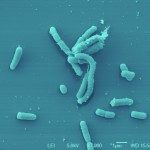Lien vers Pubmed [PMID] – 8161186
Appl Environ Microbiol 1994 Mar; 60(3): 953-9
A fast and simple method to detect mycoplasmal contamination in simulated samples of animal sera by using a PCR was developed. The following five mycoplasma species that are major cell culture contaminants belonging to the class Mollicutes were investigated: Mycoplasma arginini, Acholeplasma laidlawii, Mycoplasma hyorhinis, Mycoplasma orale, and Mycoplasma fermentans. After a concentration step involving seeded sera, genus-specific primers were used to amplify a 717-bp DNA fragment within the 16S rRNA gene of mycoplasmas. In a second step, the universal PCR was followed by amplification of variable regions of the 16S rRNA gene by using species-specific primers, which allowed identification of contaminant mycoplasmas. With this method, 10 fg of purified DNA and 1 to 10 color-changing units of mycoplasmas could be detected. Since the sensitivity of the assay was increased 10-fold when the amplification products were hybridized with an internal mycoplasma-specific 32P-labelled oligonucleotide probe, a detection limit of 1 to 10 genome copies per PCR sample was obtained. This highly sensitive, specific, and simple assay may be a useful alternative to methods currently used to detect mycoplasmas in animal sera.



